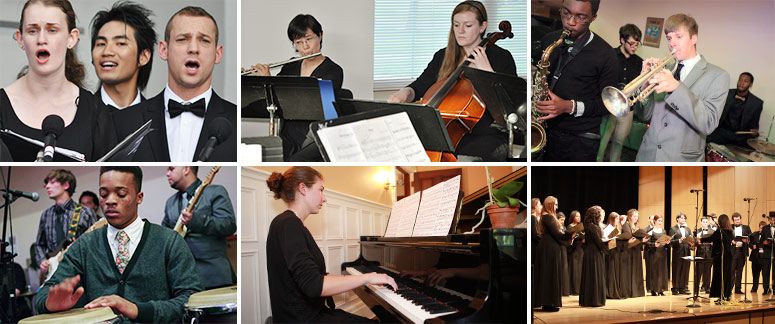Associate of Arts in Music Studies
DEGREE TYPE
TIME TO COMPLETION
LOCATIONS
MODE OF STUDY
CAREER FIELD

CT State Community College-Manchester is accredited by the National Association for Schools of Music (NASM.). Adhering to the standards established by the association, the music degree offered at CT State Manchester provides students with instruction comparable to the first two years of a four-year degree in music.
The curriculum focuses on the following: music history, music theory, music technology, music performance, and individualized vocal and instrumental instruction. The curriculum prepares students with the knowledge and skills appealing to work force pursuits (i.e., music retail stores, piano repair shops, faith-based institutions and community theater) or with a transfer-oriented course of study (i.e., music education, music therapy) towards a baccalaureate degree program in the music profession. The program also serves an ever-expanding population of students, of all ages, seeking personal enjoyment in the study of music. Students may enroll in the program on a full- or part-time basis. The music faculty and staff bring an understanding of the community college student to their teaching.
Students who are thinking of transferring are encouraged to meet with a member of the music faculty to discuss how courses transfer to other institutions. Many graduates have successfully received baccalaureate degrees from one of the four Connecticut state universities, the University of Connecticut, the University of Bridgeport and the Hartt School of Music, University of Hartford.
A Career in Music
Because the study of music can be combined with many interests, individuals who complete a degree in Music Studies will have employment opportunities in a number of areas: music education, instrumental and vocal performance, composing and arranging, recording, retail business and music technology. Some potential career choices are:
- Accompanist
- Church Choir Director
- Composer/Arranger
- Disk Jockey
- Instrumentalist
- Lyricist
- Music/Voice Teacher
- Music Store Manager
- Singer
- Sound Technician
Resources
These websites provide additional information on careers in the music field:
Get Started
Contact
Dr. Deborah Simmons
Professor, Program Coordinator Music Studies
Phone: 860-512-2674
Email: deborah.simmons@ctstate.edu
Learn More
Accreditation
CT State Manchester is accredited by the National Association of Schools of Music Studies (NASM) and in good standing.
Audition Requirements
In compliance with the National Association for Schools of Music (NASM) accrediting standards, students interested in pursuing the college’s Music Studies associate degree program are required to audition with a member of the music faculty to determine their level of instrumental or vocal music proficiency. Auditions are scheduled for 15 minutes, and students will be required to perform, in person, two contrasting compositions.
Audition Specifics
- Students wishing to matriculate into the Music Studies associate degree program must complete and return the audition application.
- The audition process is designed to assess a student’s proficiency in the ability to:
- Read and interpret standard musical notation
- Produce an acceptable tone quality on one’s instrument or voice
- Perform with rhythmic clarity and consistency of pulse
- Perform with acceptable intonation (being in tune)
- Perform with an understanding of phrasing and style
- An accompanist will be provided upon request. The student may also bring his/her own.
Note: Students who indicate prior theory instruction may have the option to be tested and receive credit for MUS* B115: Music Theory I.
Audition Dates
Spring 2025 Semester
Please check back soon for upcoming audition dates!
Performing Artist Health and Safety Information
Students are encouraged to supplement information obtained in their lessons, master classes and guest lectures regarding performing artist health and safety issues by using some of the resources listed below. Additionally, students are encouraged to take advantage of the Performing Arts Medicine Association (PAMA) in order to obtain information about available local resources. To become a student member of PAMA, please go to artsmed.org/membership-levels.
Injury Prevention and Performing Artist Health
Musculoskeletal Health and Injury
- Role of Rest
- A Painful Melody: Repetitive Strain Injury among Musicians
- Repetitive Stress and Strain Injuries: Preventive Exercises for the Musician
- MusiciansHealth.com
Psychological Health
Injury Prevention and Performing Artist Health
Although CT State Manchester’s acoustically-treated practice, rehearsal and performance facilities meet OSHA Noise Standards, students must be mindful of exposure to excessive noise levels for extended periods of time. OSHA guidelines define excessive noise levels as 90 decibels or higher for more than eight hours. For more information, please review the decibel comparison chart and musical decibel level chart, which is specific to musical performance and listening.